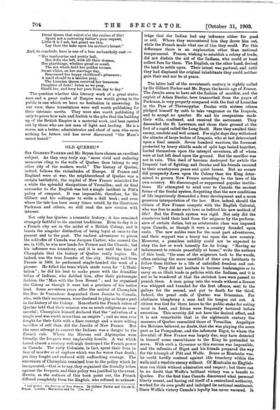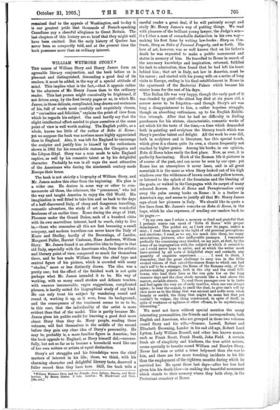OLD QUEBEC.•
SIR GILBERT PARKER and Mr. Bryan have chosen an excellent subject. As they very truly say, "more vivid and enduring memories cling to the walls of Quebec than belong to any other city of the modern world." The history of Quebec, indeed, follows the vicissitudes of Europe. If France and England were at war, the neighbourhood of Quebec was a certain battlefield; the capital of New France mimicked for a while the splendid dissipations of Versailles; and its final surrender to the English was but a single incident in Pitt's policy of conquest. It was impossible, therefore, for Sir Gilbert and his colleague to write a dull book ; and even where the tale has been many times retold, by the illustrious Parkman and others, we still read the new version with interest.
Not only has Quebec a romantic history ; it has remained strangely faithful to its ancient traditions. Even to-day it is a French city set in the midst of a British Colony, and it boasts the singular distinction of being loyal at once to the present and to the past. The earliest adventurer to pierce the solitudes of Canada was Jacques Cartier, who crossed the sea in 1535, to win new lands for France and the Church; but his influence was transitory, and it is not until the time of Champlain that the history of Quebec really begins. He, indeed, was the true founder of the city. Setting sail from France in 1608, he performed single-handed the work of a pioneer. He felled the trees which made room for " L'Habi- tation" ; he did his best to make peace with the friendlier tribes of Indians, who dubbed him, after their picturesque fashion, the "Man with the Iron Breast " ; and he organised the Colony as though it were but a province of his native laud. Some seventeen years after the arrival of Champlain the Due de Veutadour despatched three Jesuits to Canada, who, with their successors, were destined to play so large a part in the history of the Colony. Henceforth the French rulers of Quebec held that their mission was as much religious as com- mercial; Champlain himself declared that the "salvation of a single soul was worth more than an empire " ; and no men ever fought for their faith with a finer courage and a more willing sacrifice of self than did the Jesuits of New France. But the mere attempt to convert the Indians was a danger to the French rule. Where the Hurons and Algonquins were friendly, the Iroquois were implacably hostile. A war which lasted almost a century well-nigh destroyed the French power in Canada. The early Colonists, in fact, spent their lives in fear of murder or of capture which was far worse than death ; yet they fought and endured with unflinching courage. The successors of Champlain remained true to the policy which he inaugurated,—that is to say, they organised the friendly tribes against the Iroquois, and their policy was justified by the event. Herein, as the authors of this book point out, the French differed completely from the English, who refused to acknow- • Old Quebec the Forteens of lies Prance. By Gilbert Parker and Claude G. Bryan. Landon : Macmillan and Co. [15a. net.] ledge that the Indian had any influence either for good or evil. Where they encountered him they drove him out, while the French made what use of him they could. For this difference there is an explanation other than national temperament. France, wishing to establish a colony of trade, did not disdain the aid of the Indians, who could at least collect furs for them. The English, on the other hand, desired the land to settle upon. Their intent was pastoral, and until they had displaced the original inhabitants they could neither gain their end nor be at peace.
The latter half of the seventeenth century is rightly called by Sir Gilbert Parker and Mr. Bryan the heroic age of France. The Jesuits seem to have set the fashion of sacrifice, and the exploit of Adam Daulac, here transcribed from the pages of Parkman, is very properly compared with the feat of Leonidas in the Pass of Thermopylae. Daulac with sixteen others pledged himself by oath to take vengeance on the Iroquois, and to accept no quarter. He and his companions made their wills, confessed, and received the sacrament. They descended the St. Lawrence, and chose their ground at the foot of a rapid called the Long Sault. Here they awaited their enemy, resolute and well armed. For eight days they withstood the attacks of large bodies of Iroquois, who at last determined upon a final assault. Seven hundred warriors, the foremost protected by heavy shields made of split logs lashed together, hurled themselves upon the intrepid seventeen, ali of whom were at last left dead upon the ground. But the sacrifice was not in vain. This deed of heroism destroyed for awhile the Iroquois' lust of fighting, and Daulac and his friends ensured to their countrymen peace and quiet homes. But no sooner did prosperity dawn upon the Colony than the King deter- mined to govern New France according to the laws of his own country. He discouraged or suppressed popular institu- tions. He attempted to send over to Canada the ancient forms of the feudal system, forgetting that the new conditions of life imperiously demanded a freer development and a more generous interpretation of the law. How, indeed, should the citizen of New France compete with the English Colonial, who was free to make such laws as befitted his new method of life ? But the French system was rigid. Not only did the censitaires hold their land from the seigneur by the perform- ance of certain duties, but an aristocratic class was imposed upon Canada, as though it were a country founded upon caste. The new nobles were for the most part adventurers, and their support was a heavy tax upon the new country. Moreover, a penniless nobility could not be expected to obey the law or work honestly for its living. " Having no inducement to remain peacefully at home," write the authors of this book, " the sons of the seigneurs took to the woods, often enticing the more unsettled of their own habitants to follow them thither to a life of unbridled freedom and out- lawry." They did not hesitate to become bushrangers or to carry on an illicit trade in peltries with the Indians, and it is not to be wondered at that the strictest laws were passed to punish them. A man going into the woods without a license was whipped and branded for the first offence, sent to the galleys for the second, and put to death for the third. Indeed, the penal code of Quebec was Draconian. For obstinate blasphemy a man had his tongue cut out. A citizen was tied for three hours to the public stake for eating meat in Lent, and felons were frequently tortured before execution. This severity did not have the desired effect, and it is not remarkable that in the eighteenth century the manners of Quebec resembled those of Versailles. Angelique des Meloises believed, no doubt, that she was playing the same part as La Pompadour, and the infamous Bigot, to whom the downfall of New France was largely due, may have detected in himself some resemblance to the King he pretended to serve. With such a Governor as this success was impossible, and the infamies of Bigot and his friends prepared the way for the triumph of Pitt and Wolfe. Brave as Montcalm was, he could hardly contend against idle treachery within the walls and a resolute enemy without. Of hiontcalm no English- man can think without admiration and respect ; but there can be no doubt that Wolfe's brilliant victory was a benefit to Quebec. For the first time Canada discovered what personal liberty meant, and having rid itself of a centralised authority, worked for its own profit and indulged its national sentiment. Since Wolfe's victory Canada's loyalty has never wavered. It
remained deaf to the appeals of Washington, and to-day it is our greatest pride that thousands of French-speaking Canadians pay a cheerful allegiance to Great Britain. The last chapters of this history are so brief that they might well have been omitted. But the early history of Quebec has never been so compactly told, and at the present time the book possesses more than an ordinary interest.



















































 Previous page
Previous page